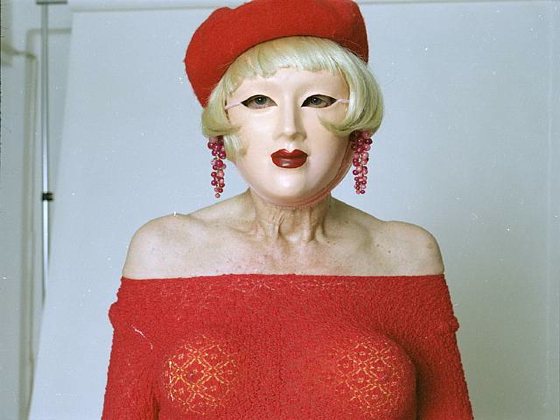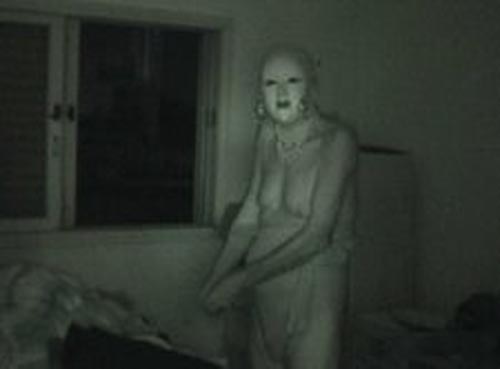There is an elementary school exercise in which you identify your location in increments moving outward. The point of making this list, which sounds something like “I’m in my head, my chair, the classroom, the school building, the town, the state,” etc., is to prove that our knowledge is always limited by “my head” as its starting point, and “the universe” as its end. Rona Yefman's extensive documentation of aging transvestite Martha Bourke begets this sort of realization: no matter how intimate we become with each other, we'll never fully understand what's outside the self.
The 80-year-old Polish grandfather wears a long, blond wig, an expressionless doll face mask, red tights, low black heels, and a woven white dress, stretched tight across her erect fake tits and belly. She looks pregnant. Through a small TV on the floor of Derek Eller Gallery, we watch Bourke shuffle around an art museum, alternatively hands-on-hips diva and hands-on-thighs teenager. She trudges around early 20th century artworks as though in slippers; she casually peers into a glass sculpture case like it’s a fish tank. At one point, the camera pans to a family who can’t help but gape as they walk out.
The second room reflects the way Bourke sees herself: eye-level photographs of a diva, shot against a white backdrop, masked, and striking various cabaret poses in various red stretch-wear. On the bed, she’s a sex kitten, legs splayed. We easily grow comfortable with the persona: a mask or bandana don’t cover her identity so much as complete it. The settings and subjects are disjointed, yet they make dream-like sense. There’s an at-home, low-budget quality, in backdrops that are not cropped out or a cat that wanders on set. Letters cut from mirror plexi on a square column read as messages from Martha’s subconscious: “In my dream I was dreaming/ You (backwards D)ream thing/ Scary dreams./ You go back down to the valley,/ You are in the valley;/ And you see another mountain. M.M.B. 2004”
If this idealized version of Martha is “the valley,” then the back room presents another mountain. Dual video projections are again unflattering, but here is the most complete picture- or, perhaps, Yefman's picture. Martha walks down the street at night, futzes around the apartment, and constantly rotates outfits. The camera person, presumably Yefman, extracts random biographical tidbits from Martha, like that she's a lesbian. Once, Martha says, someone on a bus called the police because they were afraid of her mask. Yefman relentlessly prods: “Did you have a happy childhood?” Half talking to herself, Martha replies, “Up until the Holocaust, yes,” but as she continues to think about it, her tone turns somber. The children of Poland had no idea anything was going on, she says- the Nazis arrived out of the blue. Within a day, her beautiful childhood was over; within two, her father was murdered. While she divulges, she continues to poke around for some item of clothing.
Logic is missing in the narrative that Yefman has created, but it makes sense; a personality does not fit into a single narrative, it just adopts pieces of existing icons that are close. Do we really know Martha Bourke? What does Martha tell us about ourselves? It's clear that Martha would rather be a transvestite sex kitten than a Holocaust survivor; most people would prefer her to be the latter. Marath a Bourke is a collaboration of nine years, but for all Yefman's prodding, the mask is our most substantial handle. This is a liberating feeling, as we realize that what's behind it might not be so real.




Comments on this entry are closed.